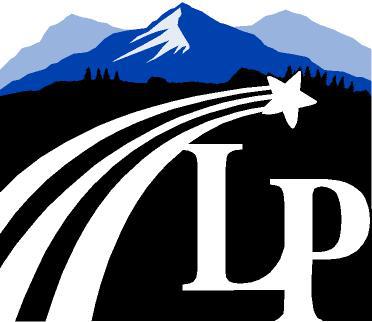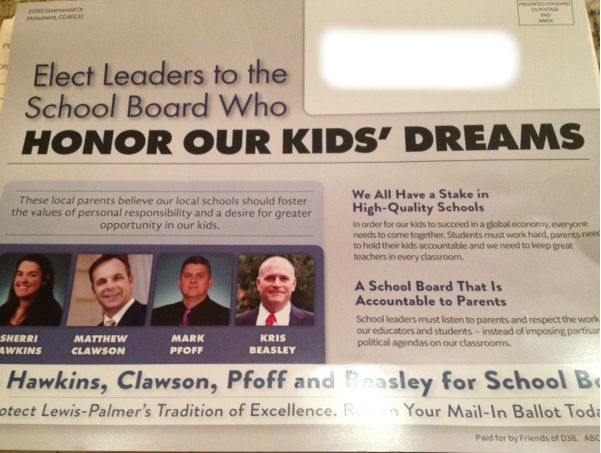A stretch of treacherous highway in the winter is not the only thing Monument Colorado is known for.
This small town and surrounding areas in South Central Colorado has grown accustomed being one of the top school districts in the state.
In 2014, the most recent year information is available, the district received an overall score of 87.7 percent in the areas of academic achievement, academic growth, closing the gaps in growth among students with risk factors and post-secondary and workforce readiness.
It exceeds or meets state expectations in every category. In fact, it is one of only 24 school districts out of 185 state wide to be Accredited with Distinction by the Colorado Department of Education, the highest accreditation possible.
But despite the fact that Lewis-Palmer District 38’s community appears to be quiet, things are anything but. In fact, parents take to the Facebook page LP Parents with many complaints, aimed mostly at School Board President Mark Pfoff.

Pfoff is at the center of controversy with Monument Academy charter school, which educates 15 percent of the district’s students. He is accused of running his re-election campaign on the back of the local teachers association. He recently supported a controversial policy that stymied free speech and encouraged the use of executive sessions against Colorado’s open meeting laws. Many say he simply does not support the conservative mindset of his constituents, that he is generally out of touch.
Pfoff contacted Complete Colorado after a story on Monument Academy reported that he failed to return requests for comment. Complete Colorado attempted contact by email, the same way it had on a previous story, but this time Pfoff said he never received the email. Complete Colorado sat down with Pfoff and former board member John Mann to get their thoughts on what is happening in the district to make so many frustrated.
Both men say they are confused about why parents are upset. They point to bailing the district out of financial trouble after it used its reserve funds for years to give pay raises to teachers. They also reference high academic achievement as an accomplishment of the district.
To get out of its financial woes, the men say they cut the budget by roughly 10 percent just before the bottom fell out of the economy in 2008. Like all school districts during the recession, D38 froze teacher salaries for several years.
They trimmed the payroll through attrition and retirement. They cut positions, including some of their top administrators, like the director of curriculum and instruction, director of IT, and director of security. And they ended popular incentives, such as an extra year of pay after 15 years of service and continuing health insurance after retirement.
To their credit, in 2014 – 10 years ahead of schedule – they were able to pay off roughly $4 million in Certificates of Participation (COPs) debt that they say had become the district’s financing choice.
“With all that, the COPs and everything, some years it was a $1 million off the top before the kids got their first nickel,” Pfoff said. “Now the payments we were making on COPs ($300,000 per year after a refinance) we can spend on kids. I feel like we did some pretty good things.”
Despite their fiscal responsibility, parents argue their frustrations on the public Facebook page, which both men say are actually the frustrations of just a loud few.
“It’s the same people,” Pfoff said. “A dozen people that have issues with the district for one reason or another and then use a conversation that allows them to draw others in.”
Pfoff started his own public Facebook page after his re-election in November to keep an open line of communication with parents, students, and teachers.
One of the most heated issues right now is an ongoing struggle with Monument Academy Charter School and its request that the district equitably share revenue from a 16-year-old mill levy override. Pfoff has gone on record saying the district would be stealing money from one student to give to another.
 Don Griffin, executive director of the school, has said on record that the school has lost out on an average of $600,000 per year in funds since 1999, and school officials are willing to take the issue all the way to the Colorado State Board of Education, or to ask a judge to decide.
Don Griffin, executive director of the school, has said on record that the school has lost out on an average of $600,000 per year in funds since 1999, and school officials are willing to take the issue all the way to the Colorado State Board of Education, or to ask a judge to decide.
Pfoff says he does not have the authority to make that decision.
“That’s a voter initiative,” Pfoff said. “This was decided on by voters 16 years ago … I’ve talked to several past LP board members and the superintendent who say they were not a part of it.”
Pfoff argues that Monument Academy had a charter renewal two years after the vote, and they didn’t ask for the revenue then – or anytime since then. He wonders why now.
“You can’t tell me in 2001 they weren’t very aware what was going on with the MLO,” Pfoff said. “They knew they weren’t involved.”
Griffin says until now the school took the district at its word. It only recently decided to ask for proof, something the district has not been able to offer.
Pfoff suggests the school take the issue to the voters in November and let them decide if they want to share the 1999 MLO. He would also like the school to outline why it needs the money, adding the state gives the school roughly $200,000 a year in funding that the traditional schools don’t get.
The money is an attempt by the legislature a few years ago to recognize a lapse in charter school funding. It goes to schools who have capital expenses, but doesn’t come close to meeting the yearly mortgage costs, which traditional schools are able to finance through bonds, charter school leaders say.
The remaining portion of the charter school’s mortgage is paid for by per-pupil revenue, taking that money away from the classroom. Because most traditional public schools receive facilities funding through district-level bonds or other sources external to their schools, they typically do not have to pull money from their per-pupil revenue.
Although Griffin say’s parents shouldn’t worry about the school shutting down, he pointed out that if there were no Monument Academy, that money go toward educating the 900 students in traditional schools.
Pfoff said the idea the district would have to absorb Monument students isn’t an issue. Monument reported 953 students this year. Pfoff said in 1999 when the MLO passed, about half of those were from outside District 38 and wouldn’t be able to stay in D38 if the school dissolved.
According to the Colorado Department of Education, only 151 or 15 percent of Monument Academy students are from outside the district. The district’s traditional schools educate 383 students from outside D38. And 762 D38 students leave the district for educational needs.
Pfoff said he is willing to fight as well.
“The question is how much is it worth to defend our voters,” Pfoff said. “You’re going to intimidate me though a lawsuit? I could care less about the Colorado Board of Education. They can’t tell me what to do. … I will defend the voters of last November, and I’ll defend the voters of 1999. So if we have to take it to a lawsuit that’s what we’ll do.”
On its Thursday consent agenda, the school board was scheduled to approve an extension to May 20 on the charter school contract negotiations. Charter school officials are hoping the district’s willingness to postpone is a sign they will address the issue and are considering settling, charter officials said.
Pfoff is also taking heat on his Facebook page over how he funded his 2015 re-election campaign. Filings with the Secretary of the State’s office showed he had no revenue and no expenditures. Most of the election material came entirely from the Political Committee Friends of D38.
In fact, all four candidates the CEA endorsed donated to Friends of D38 – Sherri Hawkins ($200), Matthew Clawson ($400), Kris Beasley ($400) and Pfoff ($300), and none showed revenue or expenditures in their filings with the state.
“They are a great group,” Pfoff said. “They have supported this district for many years. I would never donate any money to any teachers union. CEA or whatever. I donated money to them because we had a mutually agreed upon cause, which was to get the four of us elected.”
 However, Friends of D38 received 75 percent of its funding though the Public Education Committee, a small donor committee belonging to Colorado Education Association, the parent association to most all the teachers unions in the state. Some local district unions associate with the American Federation of Teachers.
However, Friends of D38 received 75 percent of its funding though the Public Education Committee, a small donor committee belonging to Colorado Education Association, the parent association to most all the teachers unions in the state. Some local district unions associate with the American Federation of Teachers.
The CEA also endorsed the four candidates in its literature to Lewis-Palmer Education Association members.
“I contributed when they said, hey we want to back you guys,” Pfoff said. “The arrangement they made with CEA later on, I have nothing to do with.”
Pfoff questioned why he would want to stop them.
“It’s our teachers. How proud could a person be having been on the board for seven or eight years and your teachers are like ‘yeah,’ (even) after you’ve frozen their pay for three or four years. … When you run a campaign you want to embrace everybody. They are making a big deal because some democrats liked me. What am I supposed to do, say ‘no you’re a Democrat, don’t vote for me?’ I embrace everyone. Public education is supposed to be nonpartisan. And that really is what my view is, and I think that’s why I’ve done so well on these elections.”
Send us tips at CompleteColorado@gmail.com.


